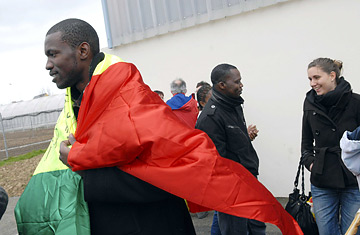
Participants gather at a picnic in Montfort-sur-Meu to support 23 Malians threatened with deportation.
"These people are our neighbors, our friends, respected members of this community, and we want them back now!" urges Claudine Rochefort, who leads the Mali-Montfort Association that has rallied townsfolk to denounce the arrests. "This isn't about politics. It's about people reacting with their hearts to what they see as tragic unfairness."
And here's the curious thing: None of the almost 6,000 Montfort residents (out of a total population of 6,500) who have demanded the Malians' return dispute the fact that those arrested had been in France illegally, some of them using forged identity papers and work permits. They may have broken the law, say their supporters, but look at their contribution to the community. Most have lived in Montfort since 2002, when they were recruited by the local abattoir struggling fill the positions. Even though much of the work involved slaughtering pigs, the Muslim Malians worked their long, early morning shifts with vigor and enthusiasm, gradually gaining speed and skill to become valued employees. Much of their earnings were sent home to families in Mali — among the poorest countries on earth — but Montfort's Malians kept enough to be able to fully participate in municipal life. They rented homes in town, played for the local soccer team and coached its youth squads; learned to read and write, and improved their French; participated in town activities and festivals, and hosted and accepted dinner invitations with fellow Montfortais. Deportee Sidy Coulibaly had lived with a young local woman for three years, and who is five months pregnant with his first child.
"Every time you turn on the TV, radio, or open a paper, people are talking about the threat of immigration and how immigrants and their children aren't integrating into French society," notes Serge Houngbedji, a business manager who is one of Montfort's few French-born black residents. "Here you have 23 cases of total integration of immigrants fulfilling functions the community needs, and they're rounded up an deported because they don't have the right documents. There's something wrong with that." Added a young Montfortais Malian, "People must know that when these Malians were arrested and told they'd be deported, everything they'd planned and hoped for the future vanished. It's worse than tragic. It's like your entire life dying, but your body being forced to live on."
Virtually everyone in town seems to agree. Montfort's city council has appealed for the Malians to be released and offered a path to legalization based on the merits of their situations. Their employer has sought work permits that would allow the 23 Malians to obtain resident visas, noting that productivity in his nearly 700-employee facility has fallen over 10% since their arrest. Petitions demanding the Malians return gave garnered between 4,000 and 6,000 signatures; Montfort merchants have expressed their solidarity by tying white strips of cloth outside their stores; and marches and rallies continue drawing large crowds. "Everyone is aware immigration policies are a necessary evil, but even evils have to have some heart," says a local supermarket employee who only gives her name as Linda. "These Malians are now in our hearts, and if the French authorities applying French immigration policies aren't moved by that, then I'll be disgusted and ashamed to be French."
Despite the national attention and support generated by the campaign on behalf of the Malians, the authorities are unmoved. Conservative presidential candidate Nicolas Sarkozy continues to hammer his get-tough immigration message, even provoked protest among his own supporters when he promised to create a "ministry of immigration and national identity." In his current role as Interior Minister, meanwhile, Sarkozy insists the law must be upheld, although he offers that the Montfort Malians will be given preferential treatment if they return to Mali and apply for residence visas. No dice, say their supporters.
"Sarkozy's own law prohibits deported foreigners guilty of crimes from returning to France for five years," notes Rochefort — who also thinks the sudden roundup was politically motivated. "He's trying to seduce voters from the extreme right with his anti-immigrant message, and this was supposed to show them, See, I even root them out in little remote rural towns of Brittany.' "
Montfort residents vow to continue calling attention to the case until all 23 are free to return to the town with papers. This week, they got help from Malian presidential candidate Tiabali Dram, who lived for almost two decades as a political exile in France, and saluted the "the kindness, charity and humanity France has traditionally offered immigrants." He added, "Some in France want that to change, but I come to Montfort today thank its people for demonstrating how that tradition remains alive." The fate of the 23 Malians arrested in the town, however, may depend on whether the French electorate agrees.
